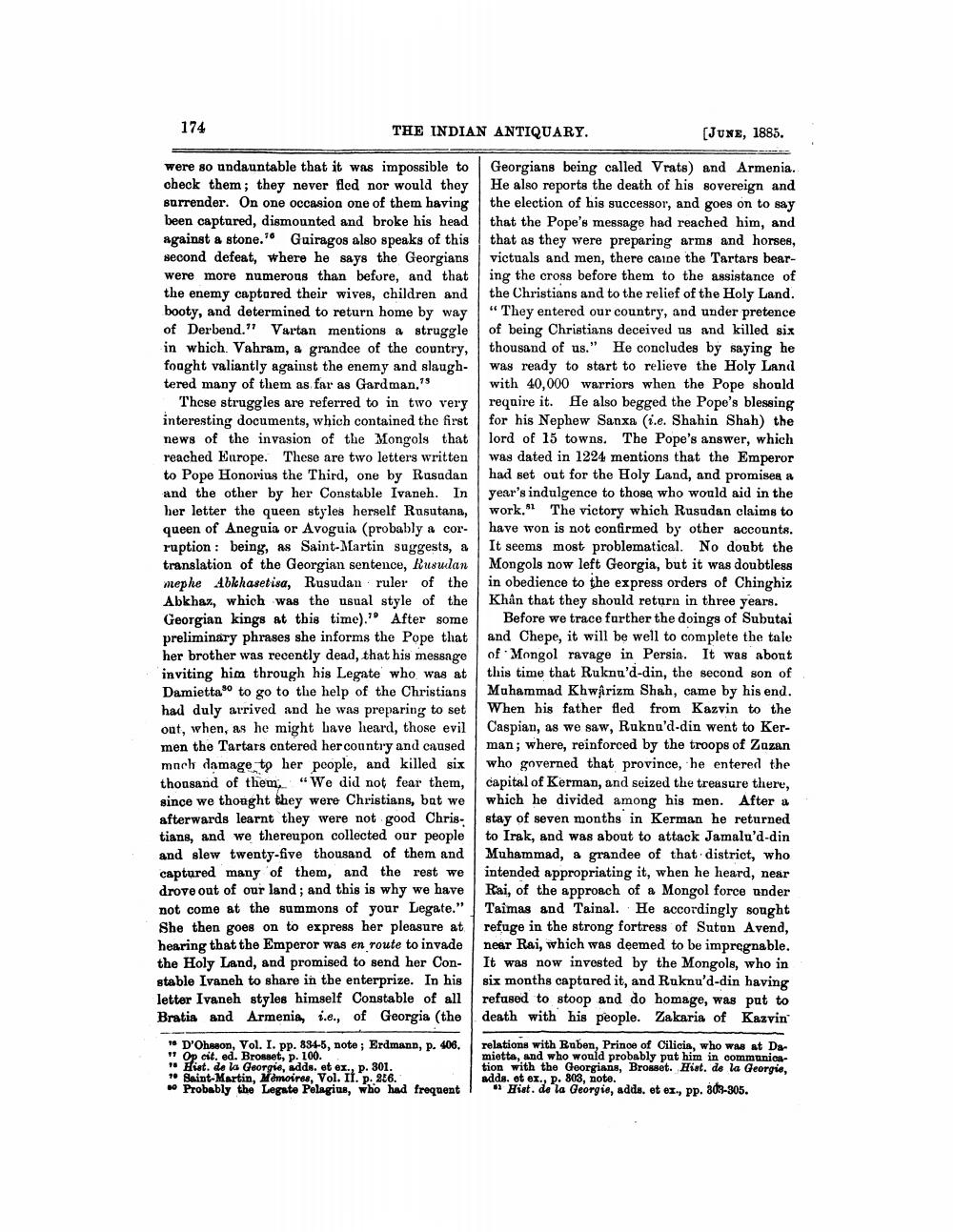________________
174
THE INDIAN ANTIQUARY.
(JUNE, 1885.
were 80 undauntable that it was impossible to obeck them; they never fled nor would they surrender. On one occasion one of them having been captured, dismounted and broke his head against a stone." Guiragos also speaks of this second defeat, where he says the Georgians were more numerous than before, and that the enemy captured their wives, children and booty, and determined to return home by way of Derbend." Vartan mentions a struggle in which. Vahram, a grandee of the country, fought valiantly against the enemy and slaughtered many of them as far as Gardman."
These struggles are referred to in two very interesting documents, which contained the first news of the invasion of the Mongols that reached Europe. These are two letters written to Pope Honorius the Third, one by Rusudan and the other by her Constable Ivaneh. In her letter the queen styles herself Rusutana, queen of Aneguia or Avoguia (probably a corruption : being, as Saint-Martin suggests, a translation of the Georgian sentence, Rusulan mephe Abkhasetisa, Rusudan ruler of the Abkhaz, which was the usual style of the Georgian kings at this time). After some preliminary phrases she informs the Pope that her brother was recently dead, that his message inviting him through his Legate who was at Damietta to go to the help of the Christians had duly arrived and he was preparing to set out, when, as he might have heard, those evil men the Tartars entered her country and caused much damage to her people, and killed six thousand of them. "We did not fear them, since we thought they were Christians, but we afterwards learnt they were not good Chris. tians, and we thereupon collected our people and slew twenty-five thousand of them and captured many of them, and the rest we drove out of our land; and this is why we have not come at the summons of your Legate." She then goes on to express her pleasure at hearing that the Emperor was en route to invade the Holy Land, and promised to send her Constable Ivaneh to share in the enterprize. In his letter Ivaneh styles himself Constable of all Bratia and Armenia, i.e., of Georgia (the
* D'Ohsson, Vol. I. pp. 834-5, note; Erdmann, p. 406. "Op. cit. ed. Brosset, p. 100. ** Hist. de la Georgie, adds. et ex., p. 301. ** Saint-Martin, Mémoires, Vol. II. p. 256. * Probably the Legate Pelagius, who had frequent
Georgians being called Vrats) and Armenia. He also reports the death of his sovereign and the election of his successor, and goes on to say that the Pope's message had reached him, and that as they were preparing arms and horses, victuals and men, there caine the Tartars bearing the cross before them to the assistance of the Christians and to the relief of the Holy Land. “They entered our country, and under pretence of being Christians deceived us and killed six thousand of us." He concludes by saying he was ready to start to relieve the Holy Land with 40,000 warriors when the Pope should require it. He also begged the Pope's blessing for his Nephew Sanxa i.e. Shahin Shah) the lord of 15 towns. The Pope's answer, which was dated in 1224 mentions that the Emperor had set out for the Holy Land, and promises a year's indulgence to those who would aid in the work." The victory which Rusudan claims to have won is not confirmed by other accounts. It seems most problematical. No doubt the Mongols now left Georgia, but it was doubtless in obedience to the express orders of Chinghiz Khân that they should return in three years.
Before we trace further the doings of Subutai and Chepe, it will be well to complete the tale of Mongol ravage in Persia. It was about this time that Ruknu'd-din, the second son of Muhammad Khwärizm Shah, came by his end. When his father fled from Kazvin to the Caspian, as we saw, Ruknu'd-din went to Kerman; where, reinforced by the troops of Zuzan who governed that province, he entered the capital of Kerman, and seized the treasure there, which he divided among his men. After a stay of seven months in Kerman he returned to Irak, and was about to attack Jamalu'd-din Muhammad, a grandee of that district, who intended appropriating it, when he heard, near Rai, of the approach of a Mongol force under Taimas and Tainal. He accordingly sought refuge in the strong fortress of Suton Avend, near Rai, which was deemed to be impregnable. It was now invested by the Mongols, who in six months captared it, and Ruknu'd-din having refused to stoop and do homage, was put to death with his people. Zakaria of Kazvin
relations with Ruben, Prince of Cilicia, who was at Damietta, and who would probably put him in communication with the Georgians, Brosset. Hist. de la Georgie, adds. et ex., p. 803, note.
Hist. de la Georgie, adds. et ez., pp. 303-305.




